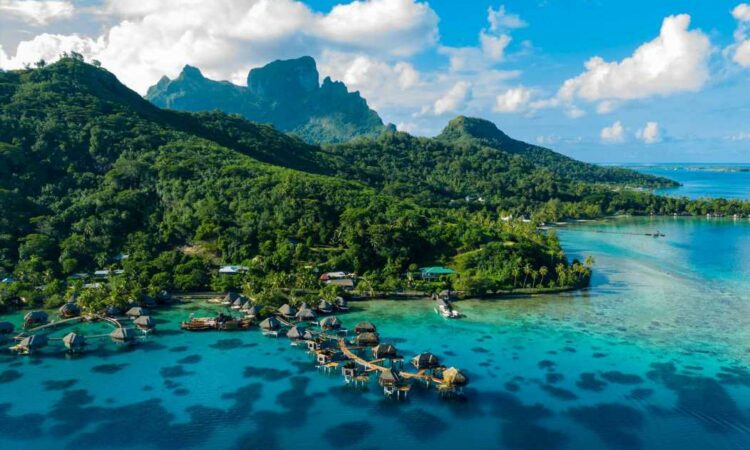Sitting on an airline voucher for a trip to the remote Pacific, or crossing your fingers for a New Zealand visit in the near future? There are a few things you need to know about local travel restrictions before you start booking.
The pandemic prompted nations of Oceania small and large to crack down on international travel more than a year ago, barring most travelers from the region completely. And with COVID-19 cases still springing up across the globe, and vaccinations slow to mount throughout Oceania, it’s still difficult to visit most destinations whether or not you’re vaccinated—with a few exceptions.
Here’s where you can travel in the region of archipelagos, and the nations sticking to tourism shutdowns until further notice. Read on for New Zealand, Bora Bora, and Australia travel restrictions, and beyond.
Australia
Nonessential travel “remains strictly controlled to help prevent the spread of COVID-19,” according to officials in Australia—which has kept its coronavirus case count extremely low since mid-2020 through border shutdowns and tight restrictions on leisure travel (both international and domestic). Per the current Australia travel restrictions, anyone visiting must acquire an exemption granted by the government, which only applies to critical workers or those who must travel for emergency purposes related to family (i.e. a death or illness). And even those with an exemption must quarantine upon arrival for 14 days in a government-run facility. The only exception to that rule is quarantine-free flights from New Zealand, which require travelers to have been in the country for at least 14 days.
New Zealand
According to the government of New Zealand, which has kept COVID-19 cases to a minimum throughout the pandemic, its borders remain “closed to almost all travelers to help stop the spread of COVID-19.” Quarantine-free travel is only possible (albeit with testing requirements in place) from Australia, the Cook Islands, and Niue—all places maintaining near-zero coronavirus case rates that have political ties to New Zealand. Family members of New Zealand citizens and permanent residents are only permitted to enter if they quarantine in a government-run facility for 14 days. It remains unclear when the nation, which was once hugely popular with tourists for its other-worldly landscapes and Lord of the Rings fame, will reopen, and officials have signaled it’s unlikely to happen soon. Even visas for long-term visitors like students have been extremely restricted due to the coronavirus. Find more information here.
French Polynesia
The 118 French Polynesian islands, including Bora Bora and Tahiti, have reopened to fully vaccinated travelers from certain “green” nations including the United States, as of June 9. The broader reopening occurred along with the reopening of mainland France, after an early-opening period from May 1 during which curfews were still in place (they have since been lifted). All visitors must test negative for COVID-19 within the three days prior to arrival; full vaccination is defined as 14 days after second Moderna and Pfizer shots, or 28 days after a single-dose Johnson & Johnson shot.
Each traveler must submit an Electronic Travel Information System (ETIS) form confirming their vaccination, other health information, and travel itinerary at least six days before departure. Air Tahiti states that while officials permit unvaccinated children to enter the archipelago with their vaccinated guardian(s) if they test negative and are under-18, a “compelling reason” for travel will be required of anyone over age 11 who is not vaccinated.
Fiji
The archipelago nation of Fiji is currently seeing its first substantial upswing of COVID-19 cases, and does not allow Americans to enter without quarantining on arrival. The country has administered coronavirus vaccinations to less than one percent of its population, though the Fijian tourism board has expressed hope that mounting vaccinations will eventually “[restore] the livelihoods for thousands of Fijians, who are dependent on the tourism sector.”
Marshall Islands
The archipelago of the Marshall Islands has remained closed to tourism since early 2020, which has prevented the coronavirus from taking hold in the islands. “International travelers are not permitted to enter the Marshall Islands,” according to the U.S. Embassy in the Marshall Islands. “There has been no community transmission of COVID-19 within the Marshall Islands, and activities are proceeding as usual.”
Samoa and American Samoa
Samoa’s borders remain closed to tourism with most commercial flights canceled, a tactic that has kept its islands free of confirmed community cases of COVID-19 since the beginning of the pandemic. The ban on visitors extends to the U.S. territory of American Samoa; essential visitors, including Samoan citizens repatriating from abroad, are required to seek approval from the Samoan Ministry of Foreign Affairs. “Except in exceptional circumstances approved by Cabinet, all international travel to and from Samoa by plane [is] ceased,” the Samoan tourism board says on its website. Those who do receive permission to enter are still required to quarantine in a government facility for 14 days.
We’re reporting on how COVID-19 impacts travel on a daily basis. Find our latest coronavirus coverage here, or visit our complete guide to COVID-19 and travel.
Source: Read Full Article
